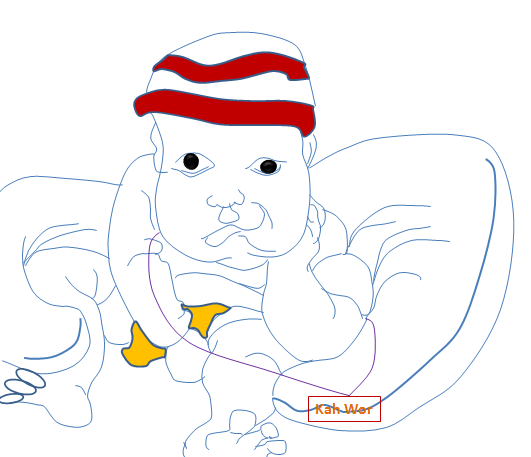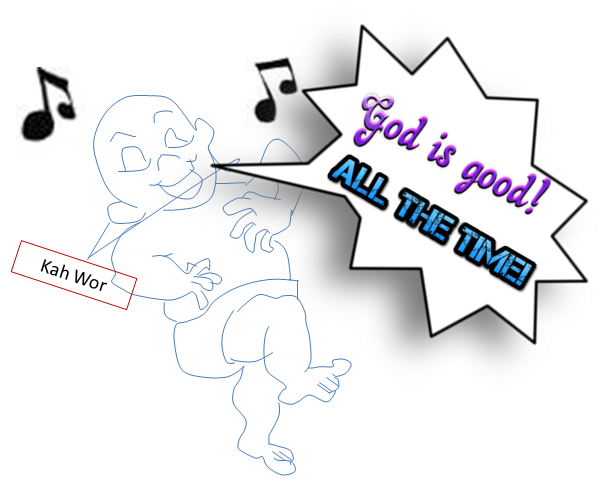Meaning
a. From 119; ruddy. That is, a human being (an individual or species, mankind, etc).
1. Adam means "man; mankind; people; someone (indefinite); Adam (the first man); or a city in the Jordan Valley, " Joshua 3:16, "That the waters which came down from above stood and rose up upon an heap very far from the city Adam, that is beside Zaretan: and those that came down toward the sea of the plain, even the salt sea, failed, and were cut off: and the people passed over right against Jericho."
2. This noun is related to the verb adom, "to be red" and therefore probably relates to the original ruddiness of human skin.
3. The noun connotes "man" as the creature created in God's image, the crown of all creation. In its first appearance adam is used for mankind or generic man; Genesis 1:26, "And God said, Let us make man in our image, after our likeness: and let them have dominion over the fish of the sea, and over the fowl of the air, and over the cattle, and over all the earth, and over every creeping thing that creepeth upon the earth."
In Genesis 2:7 the word refers to the first "man", Adam; "And the Lord God formed man of the dust of the ground, and breathed into his nostrils the breath of life; and man became a living soul."
CREATION
4. Throughout Genesis 2:5 - 5:5, there is a constant shifting and interrelationship between the generic and the individual uses:
4a. "Man" is distinguished from the rest of the creation insofar as he was created by a special and immediate act of God; Genesis 1:27, "So God created man in his own image, in the image of God created he him; male and female created he them."
4b. He consisted of two elements, the material and the non-material; Genesis 2:7, "And the Lord God formed man of the dust of the ground, and breathed into his nostrils the breath of life; and man became a living soul."
4c. From the outset he occupied an exalted position over the rest of the earthly creation and was promised an even higher position (eternal life) if he obeyed God; Genesis 1:28, "And God blessed them, and God said unto them, Be fruitful, and multiply, and replenish the earth, and subdue it: and have dominion over the fish of the sea, and over the fowl of the air, and over every living thing that moveth upon the earth. "; cf Genesis 2:16-17; "And the Lord God commanded the man, saying, Of every tree of the garden thou mayest freely eat: But of the tree of the knowledge of good and evil, thou shalt not eat of it: for in the day that thou eatest thereof thou shalt surely die."
4d. In Genesis 1, "man" is depicted as the goal and crown of creation, while in Genesis 2 the world is shown to have been created as the scene of human activity.
4e. "Man" was in God's image with reference to his soul and/or spirit. (He is essentially spiritual; he has an invisible and immortal aspect which is simple or indivisible.) Other elements of this image are his mind and will, intellectual and moral integrity (he was created with true knowledge, righteousness, and holiness), his body (this was seen as a fit organ to share immortality by which dominion over the creation was exercised), and dominion over the rest of the creation.
The Fall
5. The Fall greatly affected the nature of "man", but he did not cease to be in God's image; Genesis 9:6, "Whoso sheddeth man's blood, by man shall his blood be shed: for in the image of God made he man."
5a. Fallen "man" occupies a new and lower position before God; Genesis 6:5, "And God saw that the wickedness of man was great in the earth, and that every imagination of the thoughts of his heart was only evil continually." cf Genesis 8:21, "And the Lord smelled a sweet savour; and the Lord said in his heart, I will not again curse the ground any more for man's sake; for the imagination of man's heart is evil from his youth; neither will I again smite any more every thing living, as I have done."
5b. No longer does "man have perfect communion with the Creator; he is now under the curse of sin and death.
5c. Original knowledge, righteousness and holiness are destroyed.
5d. Restoration to his proper place in the creation and relationship to the Creator comes only through spiritual union with the Christ, the second Adam; Romans 5:12-21:
12 Wherefore, as by one man sin entered into the world, and death by sin; and so death passed upon all men, for that all have sinned:
13 (For until the law sin was in the world: but sin is not imputed when there is no law.
14 Nevertheless death reigned from Adam to Moses, even over them that had not sinned after the similitude of Adam's transgression, who is the figure of him that was to come.
15 But not as the offence, so also is the free gift. For if through the offence of one many be dead, much more the grace of God, and the gift by grace, which is by one man, Jesus Christ, hath abounded unto many.
16 And not as it was by one that sinned, so is the gift: for the judgment was by one to condemnation, but the free gift is of many offences unto justification.
17 For if by one man's offence death reigned by one; much more they which receive abundance of grace and of the gift of righteousness shall reign in life by one, Jesus Christ.)
18 Therefore as by the offence of one judgment came upon all men to condemnation; even so by the righteousness of one the free gift came upon all men unto justification of life.
19 For as by one man's disobedience many were made sinners, so by the obedience of one shall many be made righteous.
20 Moreover the law entered, that the offence might abound. But where sin abounded, grace did much more abound:
21 That as sin hath reigned unto death, even so might grace reign through righteousness unto eternal life by Jesus Christ our Lord.
6. In some later passages of Scripture adam is difficult to distinguish from ish (376) - man as the counterpart of woman and/or as distinguished in his maleness.
7. Sometimes adam identifies a limited and particular "group of men"; Jeremiah 47:2, "Thus saith the Lord; Behold, waters rise up out of the north, and shall be an overflowing flood, and shall overflow the land, and all that is therein; the city, and them that dwell therein: then the men shall cry, and all the inhabitants of the land shall howl."
8. When used of a particular group of individual "men", the noun appears in the phrase "sons of men:; Genesis 11:5, "And the Lord came down to see the city and the tower, which the children of men builded."
9. The phrase "son of man" usually connotes a particular individual; Numbers 23:19, "God is not a man [ish], that he should lie; neither the son of man, that he should repent: hath he said, and shall he not do it? or hath he spoken, and shall he not make it good?", cf Ezekiel 2:1, "And he said unto me, Son of man, stand upon thy feet, and I will speak unto thee."
The one notable exception is the use of this term in Daniel 7:13-14, "I saw in the night visions, and, behold, one like the Son of man [enos (582)] came with the clouds of heaven, and came to the Ancient of days, and they brought him near before him. And there was given him dominion, and glory, and a kingdom, that all people, nations, and languages, should serve him: his dominion is an everlasting dominion, which shall not pass away, and his kingdom that which shall not be destroyed."
Here, the phrase represents a divine being.
10. Adam is also used in reference to any given man, or to anyone male or female; Leviticus 13:2, "When a man shall have in the skin of his flesh a rising, a scab, or bright spot, and it be in the skin of his flesh like the plague of leprosy; then he shall be brought unto Aaron the priest, or unto one of his sons the priests:"
Syn: Man is represented by four apparently inconsistent aspects:
a. As adam, he is of the earth, earthly; as Ish (376 - used 967x), he is endued with immaterial and personal existence.
b. As bachur (970) he is fully developed, vigorous, unmarried man in his prime.
c. As Enosh (582 - used 32x) he is weak or incurable.
d. As Gibbor (1397 - used 54x) he is mighty and noble.
Adam
It connotes man as the creature created in God's image, the crown of all creation.
Ish (376)
It is used for man as counterpart of woman and/or as distinguished in his maleness.
Geber (1397)
It denotes a male as an antonym of a woman, many times suggesting strength, strong man.
Enosh (582)
It sets forth a collective idea man suggesting the frailty, vulnerability and finitude of man as contrasted to God.









No comments:
Post a Comment